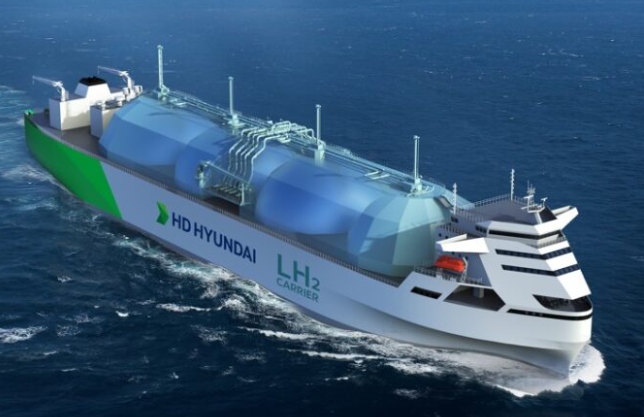
| Subject | KSOE’s 80,000㎥ electric LH₂ carrier gets DNV’s blessing | ||
|---|---|---|---|
| Reg. date | 2024-09-19 | Views | 1128 |

[Offshore Energy/September 16, 2024] Classification society DNV has awarded an approval in principle (AiP) to South Korean shipbuilder HD Korea Shipbuilding & Offshore Engineering (HD KSOE) for its electric propulsion liquefied hydrogen (LH₂) carrier design concept that could enable 80,000 cubic meters of LH₂ storage and transport.
The 80,000 electric LH₂ carrier is said to be an innovative solution that could enable large-scale hydrogen shipping and support the maritime industry’s green transition.
As explained, the milestone forms part of a broader collaboration — involving HD KSOE, Woodside Energy (Woodside), Hyundai Glovis, and Mitsui O.S.K. Lines (MOL) — aimed at developing an integrated maritime transportation value chain for large-scale liquid hydrogen.
The vessel is equipped with HD Hyundai’s new large liquid hydrogen tanks featuring advanced vacuum insulation and an electric propulsion system with hydrogen dual fuel HiMSEN engines, allowing flexible fuel use between diesel and hydrogen. The newly developed hull design and cargo handling system is targeted to provide greater operational efficiency and commercial flexibility.
The AiP from DNV verifies that HD KSOE’s electric propulsion LH₂ carrier design concept complies in principle with the safety, environmental, and technical standards necessary for the safe and efficient transport of LH2. As part of this AiP project, DNV also conducted detailed and comprehensive Hazard Identification (HAZID) and Environmental Impact Identification (ENVID) studies, which are crucial for evaluating and mitigating potential risks associated with the design and operation of the electric LH₂ carrier.
“This AiP from DNV is a crucial validation of our commitment to developing a reliable and cost-effective LH₂ carrier, Achieving this goal requires collective effort across the LH₂ shipping value chain, and we are committed to driving progress through continuous collaboration and innovation,” Chang Kwang-pil, Chief Technology Officer of HD KSOE, commented.
“We have made clear progress in the pursuit of developing cost-effective and flexible large-scale liquid hydrogen shipping supply chains to support our customers’ needs, thanks to the investment and collaborative effort of all parties involved,” Julie Fallon, Executive Vice President Technical & Energy Development from Woodside, said.
“Through the collaboration with industry leaders across the LH2 value chain, resulting in an AiP from DNV, we, as a ship owner, have gone through the process of identifying hazards, assessed risks and reviewed prevention and mitigation measures. This process will collectively guide and help us to better protect lives and cargo, and the ship itself,” Tae Woo Kim, Senior Vice President of Shipping Business Division from Hyundai Glovis, noted.
“We are very pleased with the progress made in the development of the LH2 carrier since we joined the project in February 2024. We would like to use our technical and operational knowledge, cultivated through many years of shipping experience, to continuously contribute towards establishment of a hydrogen supply chain,” Jotaro Tamura, Managing Director of MOL (Asia Oceania), Senior Management Executive Officer of Mitsui O.S.K. Lines, pointed out.
“The AiP is another vital step towards building a global hydrogen economy, through safer and more efficient long distance of LH₂. DNV is honoured to be involved in this project and to support the development of cutting-edge energy solutions,” Vidar Dolonen, DNV Regional Manager for Korea & Japan, concluded.
A year ago, DNV also granted AiP to HD KSOE and its subsidiaries HD HHI and Hyundai Mipo for their hydrogen system that utilizes boil-off gas from hydrogen transport for a hybrid propulsion system, integrating hydrogen DF engines and fuel cells.
 HOME
HOME








